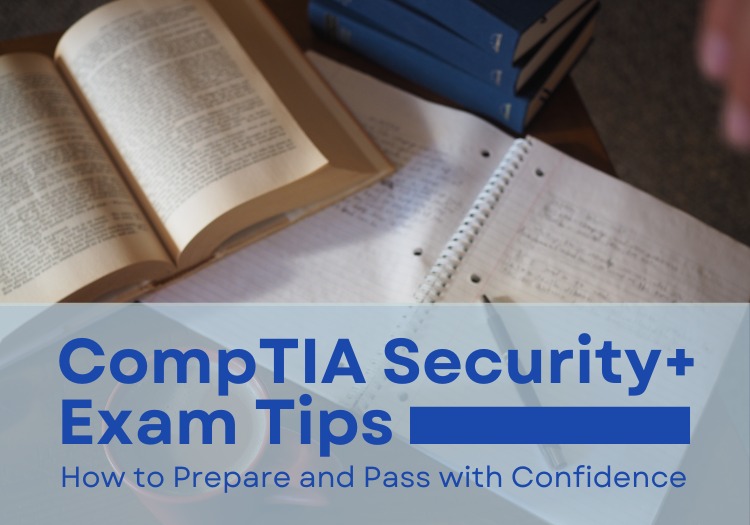Preparing for the CompTIA Security+ exam can be both an exciting and challenging journey. This certification is a significant step for anyone aiming to advance their career in cybersecurity. However, it requires a thorough understanding of various security concepts and practical skills. In this blog, we’ll explore some effective strategies and tips to help you prepare for the CompTIA Security+ exam and pass it with confidence.
Understanding the Exam Objectives
The first step in your preparation should be understanding what the exam entails. CompTIA provides a detailed list of exam objectives, which are essentially the topics you need to master. It covers the following fields:
- Threats, Attacks, and Vulnerabilities
- Technologies and Tools
- Architecture and Design
- Identity and Access Management
- Risk Management
- Cryptography and PKI
Having a clear understanding of these domains will help you identify where to focus your study efforts. Make sure to download the official exam objectives from the CompTIA website and use it as your study guide.
Creating a Study Plan
Here’s how to create structured study plan:
- Assess Your Current Knowledge: Start by taking a practice test to gauge your current understanding of the material. This will help you identify your strengths and areas that need improvement.
- Set Realistic Goals: Break down the exam objectives into smaller, manageable sections and set daily or weekly goals. For example, you could aim to cover one domain per week.
- Schedule Regular Study Time: Consistency is key. Dedicate specific times each day or week to study, and try to stick to this schedule. It’s better to study in shorter, consistent sessions than to cram all at once.
Gathering Quality Study Materials
Investing in good study materials can make a big difference in your preparation.
- Official CompTIA Study Guide: This guide is a comprehensive resource that covers all exam objectives and includes review questions to test your understanding.
- Online Courses: Platforms like Udemy, Coursera, and LinkedIn Learning offer extensive Security+ courses. These often include video lectures, quizzes, and assignments.
- Practice Tests: Taking practice exams is crucial. Websites like ExamCompass and Boson offer high-quality practice tests that mimic the actual exam format.
- Study Groups and Forums: Joining study groups or online forums can be very beneficial. Sites like Reddit’s r/CompTIA and TechExams provide a platform to discuss topics and share resources with other candidates.
Hands-On Practice
While understanding theoretical concepts is important, hands-on practice is equally crucial. Set up a home lab or use virtual labs to practice key skills. This could include configuring firewalls, setting up virtual private networks (VPNs), and using security tools like Wireshark and Metasploit. Practical experience helps reinforce theoretical knowledge and gives you a better understanding of how to apply what you’ve learned.
Focusing on Key Topics
Some topics are more heavily weighted than others on the exam. Pay special attention to these areas:
- Network Security: Understand the fundamentals of firewalls, VPNs, and network protocols.
- Cryptography: Familiarize yourself with encryption algorithms, hashing, and public key infrastructure (PKI).
- Risk Management: Learn about risk assessment, mitigation strategies, and business continuity planning.
- Identity and Access Management: Study different authentication methods, access control models, and identity federation.
Taking Care of Yourself
Preparing for an exam can be stressful, so it’s important to take care of your physical and mental health. Here are some tips:
- Prioritize Sleep: Strive for 7-8 hours of sleep each night. A well-rested brain is more alert and better at absorbing information.
- Maintain a Healthy Diet: Eating a balanced diet enhances concentration and energy levels. Limit caffeine and sugar intake to avoid energy crashes.
- Exercise Regularly: Physical activity helps reduce stress and boosts cognitive function. Even a brief daily walk can make a significant difference.
- Take Regular Breaks: Incorporate breaks into your study routine to maintain focus and prevent burnout. Techniques like the Pomodoro method, which involves 25 minutes of study followed by a 5-minute break, can be effective.
Review and Revise
As the exam date approaches, focus on reviewing and revising your study materials. Concentrate on areas where you feel less confident and use practice tests to identify any remaining gaps in your knowledge. Flashcards can be a helpful tool for quick review sessions, especially for memorizing key concepts and terms.
Exam Day Tips
On the day of your exam, follow these tips to help you do your best:
- Get There Early: Give yourself plenty of time to reach the testing center. Being rushed can make you more anxious.
- Bring What You Need: Make sure you have your ID and any other required documents. Check CompTIA’s website for a list of acceptable identification.
- Stay Calm: It’s normal to feel nervous, but try to stay calm and focused. Take deep breaths and remember that you’ve prepared well.
- Read Questions Carefully: Pay attention to each question and all answer choices. Watch out for words like “not” or “except” that can change the meaning of the question.
- Manage Your Time: Keep an eye on the clock and pace yourself. If you find a hard question, mark it and move on, then come back to it if you have time.
Conclusion
Passing the CompTIA Security+ exam requires dedication, effective study strategies, and a thorough understanding of the exam objectives. By creating a structured study plan, using quality study materials, gaining hands-on experience, and taking care of your physical and mental health, you can prepare with confidence. Remember to review and revise regularly, and use practice tests to gauge your readiness.

